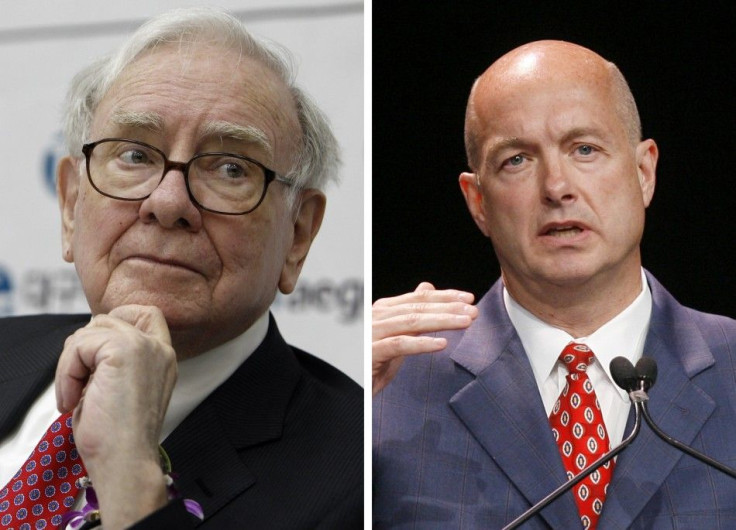COLUMN: Warren Buffett's Very Tense Press Release

Warren Buffett is known for being a plain spoken businessman.
In that sense, a press release he issued Wednesday was not out of the ordinary, even if the billionaire investor said so himself.
"This press release will be unusual. First, I will write it almost as if it were a letter. Second, it will contain two sets of facts, both about Dave Sokol, Chairman of several Berkshire subsidiaries," Buffett wrote.
Two sets of facts. Perhaps it's Buffett trying to organize the facts for his investors and other readers. However it has the air of a deposition. It's a very tense letter.
At the end, after explaining himself and the situation, Buffet says "I have held nothing back in this statement."
He anticipates further questions but states firmly he won't say more.
"If questioned about this matter in the future, I will simply refer the questioner back to this release," he wrote.
Even without knowing the situation, for the average reader, there seems to be something going on which he considers quite serious.
For Buffett watchers, his writing to investors in the letter format is nothing unusual. It's an extension of his plain style.
His company's annual reports are written in the first person. Plainness extends to the company's website, which is spare. Buffett has lived in the same home for many years.
Yet, behind that plain exterior are some very successful companies, investments and some serious money, much like the serious tone of Thursday's press release. Berkshire earned $17 billion in 2010 on Revenues of $133 billion.
Thursday's letter explained that one of his top managers, David Sokol, had decided to quit. It came very unexpectedly.
"Dave's letter was a total surprise to me, despite the two earlier resignation talks," Buffett wrote, noting that he and his board talked Sokol out of quitting twice about two years ago.
Buffett structured his letter in two parts. The first was about Sokol's competence as a manager, listing achievements. The second was about a stock purchase which came with a serious caveat. Buffett pointed out neither he nor Sokol believed the purchase was illegal.
"Neither Dave nor I feel his Lubrizol purchase were in any way unlawful," Buffett said.
Lubrizol is a chemical company which Berkshire Hathaway purchased in March for $9.7 billion, a purchase which had its spark when Sokol suggested it to Buffett three months earlier. When the company was sold to Berkshire, Sokol made $3 million on stock he bought before making the suggestion to Buffett.
And here is where some Sokol's statements, according to Buffett and those of Buffett himself show some strain. Sokol made a personal trade linked to a company he suggested to Buffett. He had stake in the company's decision on whether or not it would follow through on his suggestion. Sokol, according to Buffett, said in a resignation statement - sent through an assistant, not personally - that Bershire had been his only business priority.
Buffett published Sokol's reasons for leaving the company, among them the need to build his family's wealth to provide for his descendants and for his philanthropic efforts.
"I have no more detailed plan than this because my obligations from Berkshire Hathaway have been my first and only business priority," Sokol wrote, according to Buffett.
Yet just a month before suggesting to Buffett in January that he should buy Lubrizol, Sokol purchased about $10 million worth of shares in the company. Only until March 19, five days after Berkshire announced the purchase, did Buffett realize the extent of Sokol's holdings.
"In our first talk about Lubrizol, Dave mentioned that he owned stock in the company. It was a passing remark and I did not ask him about the date of his purchase or the extent of his holdings," Buffett wrote.
Buffett seemed indifferent to Sokol's personal business. Sokol said Berkshire Hathaway was his first and only business priority.
Five days after the March 14 announcement that Berkshire was buying Lubrizol, Buffet says he learned that on December 14, Sokol purchased 2,300 shares of the company which he sold on December 21. Then on January 5, 6 and 7, Sokol bought 96,060 shares with a $104 share price limit. That amounts to $9.99 million in stock ownership by Sokol. Lubrizol sold for $135 per share, or $13.0 million. Sokol, as mentioned earlier, earned $3 million.
Buffett explained that it was up to him and his partner Charlie Munger, to decide on the Lubrizol purchase, subject to the Board's approval. Sokol had no say, except to suggest it.
"He has told me that [the Lurizol purchases] were not a factor in his decision to resign," Buffett said.
Buffett said he had gotten "no hint" from Sokol about a forthcoming resignation in the days prior to it.
"This time, however, I did not attempt to talk him out of his decision and accepted his resignation," Buffet said.
It's a very tense letter. Buffett has vowed to not answer any more questions. Questions will come.
© Copyright IBTimes 2024. All rights reserved.











